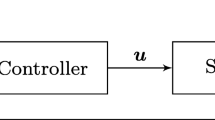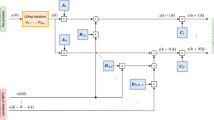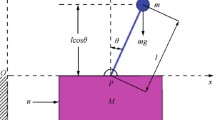Abstract
This paper is devoted to an experimental comparison between two different methods of ultra-local model control. The concept of the first proposed technique is based on the linear system resolution technique to estimate the ultra-local model parameters. The second proposed method is based on the linear adaptive observer which allows the joint estimation of state and unknown system parameters. The closed-loop control is implemented via an adaptive PID controller. In order to show the efficiency of these two control strategies, experimental validations are carried out on a two-tank system. The experimental results show the effectiveness and robustness of the proposed controllers.
Similar content being viewed by others
References
W. S. Levine, The Control Handbook, Cooperation with IEEE Press, New York, 1996.
M. Fliess and C. Join, “Commande sans modèle et commande Ãă modèle restreint,” e-STA, vol. 4, no. 5, pp. 1–23, 2008.
M. Fliess and C. Join, “Model-free control and intelligent PID controllers: towards a possible trivialization of nonlinear control?,” Proc. of 15th IFAC Symposium on System Identification, SYSID’2009, Saint-Malo, vol. 15, pp. 1531–1550, 2009.
M. Fliess and C. Join, “Model-free control,” International Journal of Control, IJF’2013, vol. 86, no. 12, pp. 2228–2252, 2013.
M. Fliess, C. Join, and S. Riachy, “Revisiting some practical issues in the implementation of model-free control,” Proc. of 18th IFAC World Congress, Milan, pp. 8589–8594, 2011.
F. Lafont, J.F. Balmat, N. Pessel, and M. Fliess, “Modelfree control and fault accomodation for an experimental greenhouse,” Proc. of International Conference on Green Energy and Environmental Engineering (GEEE-2014), Tunisia, 2014.
M. Fliess and H. Sira-Ramírez. “An algebraic framework for linear identification,” ESAIM Control Optimization and Calculus of Variations, vol. 9, pp. 151–168, 2003. [click]
M. Fliess and H. Sira-Ramírez, “Closed-loop parametric identification for continuous-time linear systems via new algebraic techniques,” In H. Garnier & L. Wang (Eds): Identification of Continuous-time Models from Sampled Data, pp. 363–391, 2008.
H. Sira-Ramírez, C. G. Rodríguez, J. C. Romero, and A. L. Juárez, Algebraic Identification and Estimation Methods in Feedback Control Systems, Wiley Series in Dynamics and Control of Electromechanical Systems, 2014.
H. Thabet, M. Ayadi, and F. Rotella, “Towards an ultralocal model control of two-tank-system,” International Journal of Dynamics and Control, vol. 4, no. 1, pp. 59–66, 2014.
H. Thabet, M. Ayadi, and F. Rotella, “Ultra-local model control based on an adaptive observer,” Proc. of IEEE Conference on Control Applications (CCA), Antibes, 2014.
Q. Zhang, “Adaptive observer for multiple-input-multipleoutput (MIMO) linear time-varying systems,” IEEE Transactions on Automatic Control, vol. 47, pp. 525–529, 2002. [click]
Q. Zhang and A. Clavel, “Adaptive observer with exponential forgetting factor for linear time varying systems,” Proc. of 40th IEEE Conference on Decision and Control (CDC), IEEE Control Systems Society, vol. 4, pp. 3886–3891, 2001.
A. M. Ali and Q. Zhang. “Adaptive observer based fault diagnosis applied to differential-algebraic systems,” In 5th IFAC Symposium on System Structure and Control, Grenoble, 2013.
I. D. Landau, Adaptive Control: The Model Reference Approach, Marcel Dekker, New York, 1979.
M. Fliess, J. Lévine, P. Martin, and P. Rouchon, “Flatness and defect of non-linear systems: introductory theory and examples,” International Journal of Control, vol. 61, no. 6, pp. 1327–1361, 1995. [click]
J. Haggège, M. Ayadi, S. Bouallègue, and M. Benrejeb, “Design of fuzzy flatness-based controller for a DC drive,” Control and Intelligent Systems, vol. 38, pp. 164–172, 2010.
F. Rotella, F. J. Carrilo, and M. Ayadi, “Digital flatnessbased robust controller applied to a thermal process,” Proc. of IEEE International Conference on Control Application, Mexico, pp. 936–941, 2001.
V. Volterra and J. Pérès, Théorie générale des fonctionnelles, Gauthier-Villars, 1936.
K. J. Aström and T. Hägglund, Advanced PID Controllers, Instrument Society of America, Research Triangle Park, North Carolina, 2nd edition, 2006.
A. O’Dwyer, Handbook of PI and PID Controller Tuning Rules, 3rd edition, Imperial College Press, London, 2009.
F. Rotella and P. Borne, Théorie et pratique du calcul matriciel, Éditions Technip, Paris, 1995.
A. Ben-Israel and T. N.E. Greville, Generalized Inverses: Theory and Applications, John Wiley and Sons, 1974.
A.H. Jazwinski, “Stochastic Processes and Filtering Theory,” in Mathematics in Science and Engineering, Academic, New York, vol. 64, 1970.
Q. Zhang, Adaptive observer for MIMO linear time varying systems, Technical Report 1379, IRISA, ftp://ftp.irisa.fr/techreports/2001/PI-1379.ps.gz, 2001.
B. D. Anderson, R. R. Bitmead, C. R. J. Johnson, P. V. Kokotovic, R. L. Kosut, I. M. Mareels, L. Praly, and B. D. Riedle, Stability of Adaptive Systems: Passivity and Averaging Analysis, series in Signal Processing, Optimization, and Control, Cambridge, MIT Press, MA, 1986.
Author information
Authors and Affiliations
Corresponding author
Additional information
Recommended by Associate Editor DaeEun Kim under the direction of Editor Ju Hyun Park
Hajer Thabet received her Master diploma in Automatic and Signal Processing in 2011 from Ecole Nationale d’Ingénieurs de Tunis (ENIT), Tunisia. From 2011 to 2015, she joined the Laboratoire de Recherche en Automatique LA.R.A. (ENIT) and the Laboratoire Génie de Production LGP (ENIT, France) where her research interests are focused on identification methods of ultra-local models for dynamic systems control. She received her Ph.D. degree in Electrical Engineering from ENIT in 2015.
Mounir Ayadi graduated from Ecole Nationale d’Ingénieurs de Tunis in 1998 and received his PhD degree in Automatic Control from the Institut National Polytechnique de Toulouse in 2002. He was a post-doctoral fellow at the Ecole Supérieure d’Ingénieurs en Génie Electrique de Rouen in 2003. He is currently Maître de Conférences at the Ecole Nationale d’Ingénieurs de Tunis and the head of Electrical Engineering Department in ENIT. His research interests are in the area of control system theory, predictive and adaptive control, and at systems.
Frédéric Rotella was born in 1957. In 1981, he received the diploma in Engineering from the Institut Industriel du Nord (Lille, France). From 1981 to 1994, he joined the Laboratoire d’Automatique et d’Informatique Industrielle de Lille where his research interests are focused on modelization and control of non linear systems. He received the Ph.D. degree (in 1983) and the Doctorat d’Etat degree (in 1987) from the University of Science and Technology of Lille-Flandres-Artois. During this period, he served at the Ecole Centrale de Lille (ex. Institut Industriel du Nord) as Assistant Professor in Automatic Control. In 1994, he joined the Ecole Nationale d’Ingénieurs de Tarbes (France) as Professor of Automatic Control. From this date he is in charge of the Department of Electrical Engineering of this engineering school. His personnal fields of interest are about control of non linear systems and time-varying linear systems. Professor Rotella is member of the Club EEA. Professor Rotella is coauthor of Théorie et pratique du calcul matriciel (1995, ed. Technip, Paris, France).
Rights and permissions
About this article
Cite this article
Thabet, H., Ayadi, M. & Rotella, F. Experimental comparison of new adaptive PI controllers based on the ultra-local model parameter identification. Int. J. Control Autom. Syst. 14, 1520–1527 (2016). https://doi.org/10.1007/s12555-014-0550-1
Received:
Revised:
Accepted:
Published:
Issue Date:
DOI: https://doi.org/10.1007/s12555-014-0550-1




